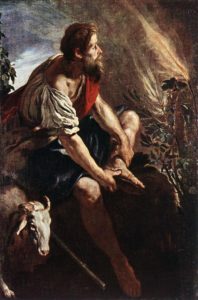Thoughts on Sunday’s Lessons for Sept. 3, 2017

Moses before the Burning Bush (1613-14). Oil painting on canvas by Domenico Fetti (1589-1623).
Kunsthistorisches Museum, Vienna. (Click image to enlarge.)
The long journey of the people from slavery in Egypt toward freedom in Canaan begins. Moses encounters God in the form of a burning bush on Mount Horeb. This is another name for Mount Sinai, where Moses will later return to receive the Ten Commandments and enter the people into covenant with God. The God of the patriarchs Abraham, Isaac and Jacob, too powerful to view face to face, occupying holy ground, tells a somewhat reluctant Moses that he is to lead the people out of Egypt. Then Moses asks a curious question: What is God’s name? “I am who I am,” God replies. “Say to the Israelites, ‘I am’ has sent me to you.”
First Reading (Track Two): Jeremiah 15:15-21
The youthful prophet Jeremiah’s sometimes angry, frequently despondent prophecies have earned him the nickname “Weeping Prophet.” We hear a little of both emotions in today’s first reading, in which we find Jeremiah confronting God and asking him to bring down retribution on those who are persecuting him. Jeremiah spoke out on God’s behalf, even though it was hard, but the ungrateful people only insulted him. “Why,” he wails, “is my pain unceasing, my wound incurable, refusing to be healed?” God responds with kindness, reassuring him: “they will fight against you, but they shall not prevail over you, for I am with you to save you and deliver you.”
Psalm (Track One): Psalm 105:1-6, 23-26, 45c
Echoing the announcement of God’s name to Moses, this Psalm of praise sings out thanksgiving and glory to God’s holy name. It, too, celebrates the people’s ancestry from Abraham, Jacob and Israel (Jacob), and recalls that they, too, sojourned as aliens and oppressed slaves in Egypt. Once the people become oppressed, God sent Moses and Aaron to bring them out. Hallelujah … praise the Lord!
Psalm (Track Two): Psalm 26:1-8
It is interesting to wonder whether Jesus had Psalm 26 in mind when he told (in Luke 18) about the Pharisee who boasted loudly of his righteousness and thanked God that he was not like the thieves, rogues, adulterers, or even tax collectors. It would be easy to read that kind of prideful piety into these verses. Let’s hear them instead in the light of Jeremiah’s woeful call for God’s grace, and envision a God whose lovingkindness inspires us to worship with thanksgiving and songful procession, loving the place where God’s glory abides.
Second Reading: Romans 12:9-21
We have read through much of Paul’s letter to the people of Rome for almost three months, since the beginning of the season after Pentecost. We have listened and learned as Paul worked out a new theology, discerning how we receive new life in God’s grace through Christ. Now we approach the end of the letter and hear a beautiful, poetic summary of Paul’s call to Rome’s Jewish and Gentile Christians to live together in love as Jesus would have done. “Hate what is evil, hold fast to what is good; love one another … Do not be overcome by evil, but overcome evil with good.” This is no dry, ancient admonition: As it was then, so is it today.
Gospel: Matthew 16:21-28
What a difference a day makes! In last week’s Gospel we heard Jesus praise Peter, calling him the rock upon which he will build the church. Now, in the verses that immediately follow, when Jesus tells the apostles that he must suffer, die and be raised again, Peter angrily demurs, prompting Jesus to turn and declare Peter “Satan,” ordering him to get out of his sight. The evangelist we know as Matthew, perhaps reflecting evolving Christian theology a generation or two after the crucifixion, depicts a powerful image of Jesus as Messiah, predicting his own death and resurrection as necessary steps toward the universal justice that will come with God’s kingdom.
What are “Track 1” and “Track 2”?
During the long green season after Pentecost, there are two tracks (or strands) each week for Old Testament readings. Within each track, there is a Psalm chosen to accompany the particular lesson.
The Revised Common Lectionary allows us to make use of either of these tracks, but once a track has been selected, it should be followed through to the end of the Pentecost season, rather than jumping back and forth between the two strands.
For more information from LectionaryPage.net, click here.
